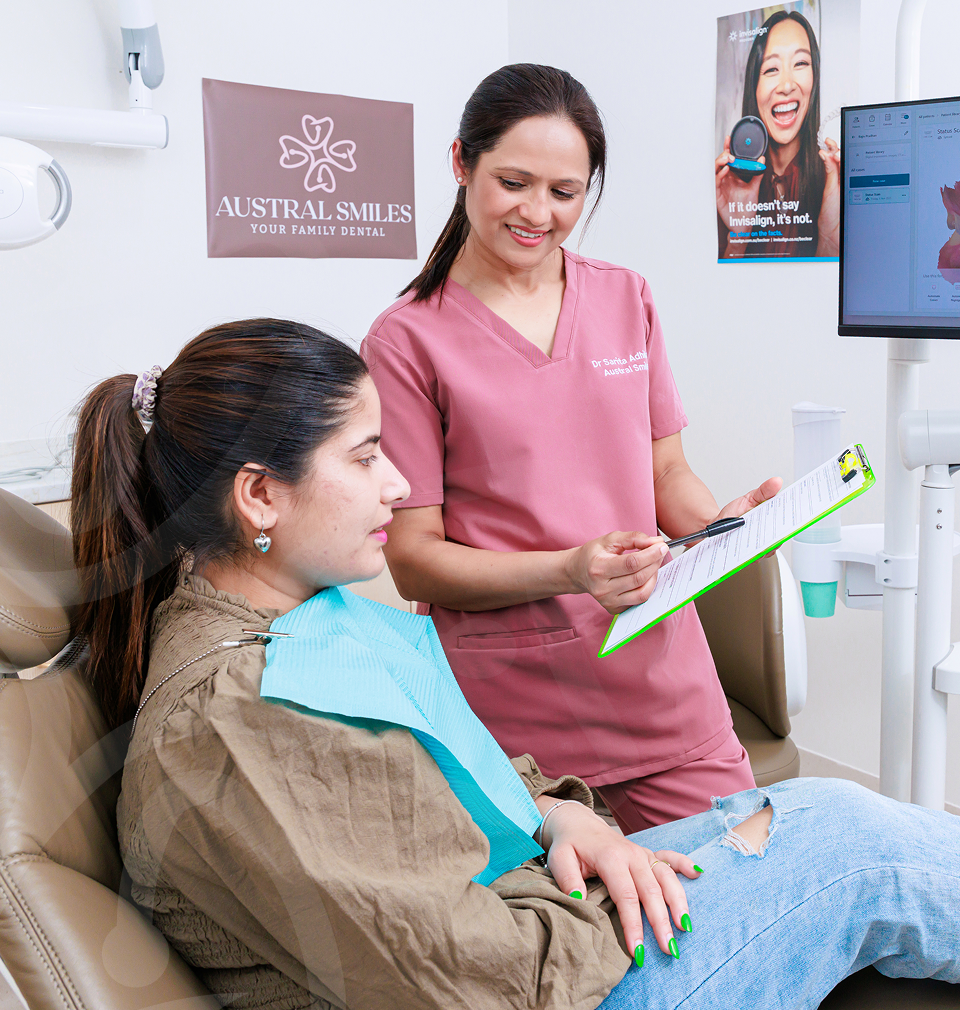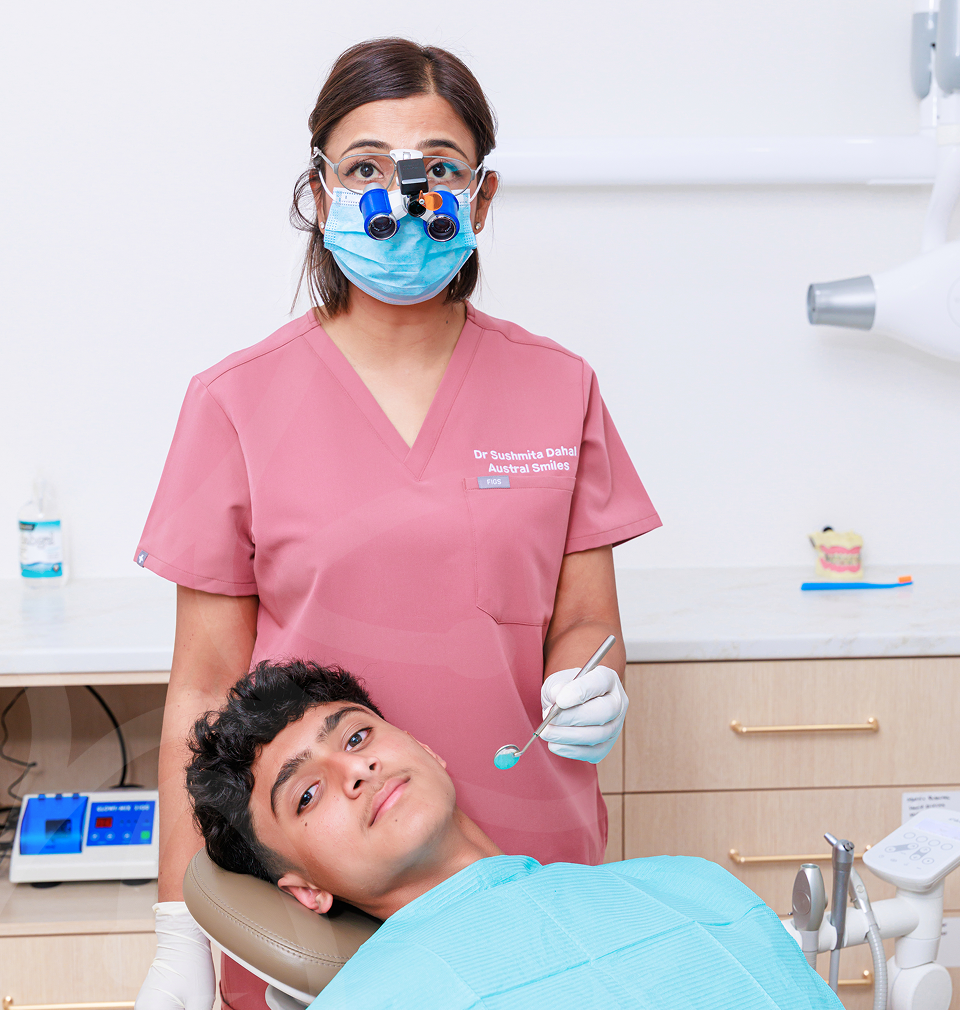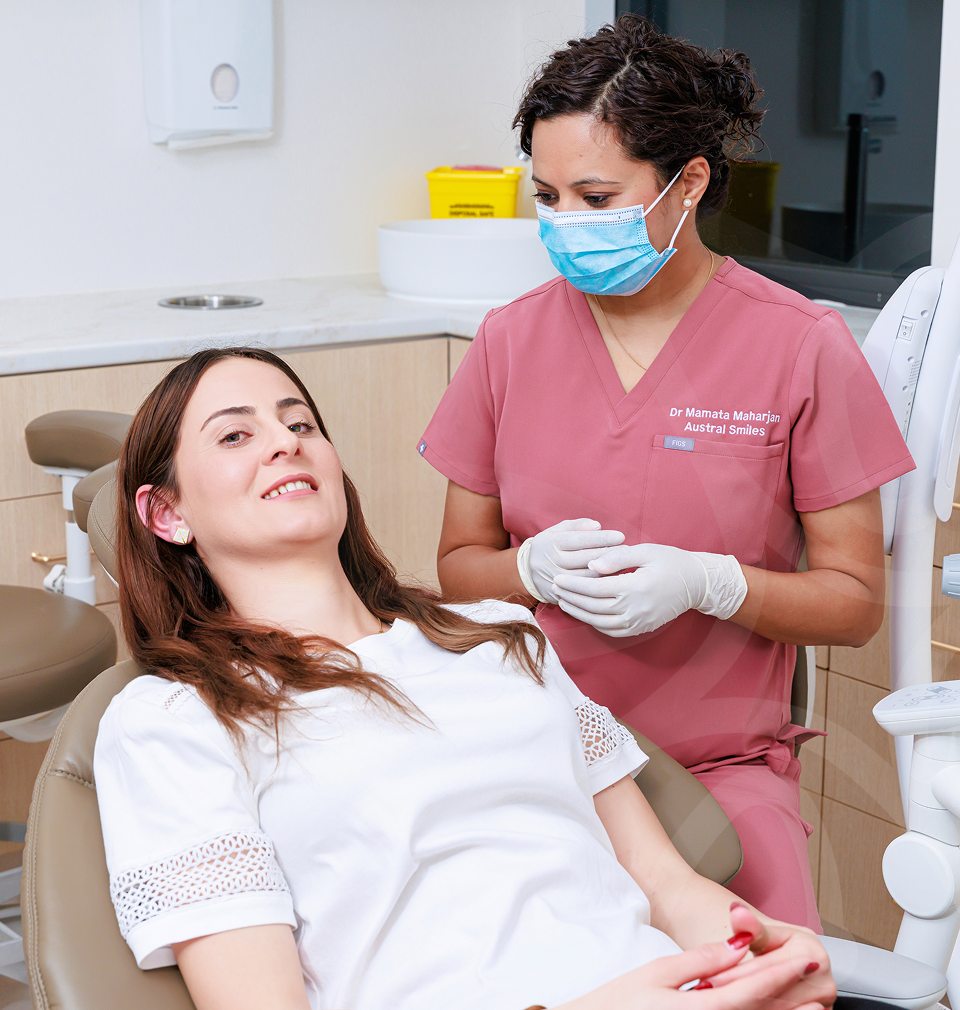Gentle, Local Dental Professionals You Can Trust
Wisdom Teeth Removal in Austral

What Are Wisdom Teeth ?
When these teeth grow at odd angles or don’t fully emerge, they can cause pain or infection. That’s why many people choose wisdom teeth extraction in Austral to protect their long-term oral health and comfort.

Signs You May Need Wisdom Teeth Removed
Jaw Pain
Ongoing pain near the back of your jaw can signal pressure from a wisdom tooth. This discomfort often worsens when chewing or opening your mouth wide.
Swollen Gums
Gums near the back of your mouth may appear red or tender or bleed when brushing. This can happen if an impacted tooth causes inflammation or traps bacteria.
Frequent Infections
Partially erupted wisdom teeth often trap food and bacteria under the gum. This can lead to recurring infections, swelling, or a bad taste in your mouth.
Teeth Crowding
If your front teeth have started shifting or overlapping, a wisdom tooth could be the cause. Pressure from the back of your mouth may change your bite.

The Real Benefits of Wisdom Teeth Removal
Removing problematic wisdom teeth can help protect your oral health, prevent future complications, and reduce discomfort. Here are four common reasons people choose wisdom tooth surgery in Austral.
Pain Relief
Wisdom teeth can place pressure on nerves, nearby teeth, or bones. Removal often reduces jaw discomfort and improves your ability to chew comfortably.
Infection Prevention
Partially erupted wisdom teeth may trap food and bacteria. This increases the risk of gum infections, swelling, and a persistent bad taste or odour.
Protecting Nearby Teeth
When wisdom teeth grow at an angle, they can press against nearby molars. Removal helps avoid potential damage such as decay or enamel wear.
Maintaining Alignment
Extra teeth at the back of your mouth can push existing teeth forward. Extracting wisdom teeth supports dental alignment and helps protect orthodontic results.

Let’s Take Care of Your Smile

A Relaxing, No-Judgement Space
Dental visits can feel daunting — we get it. That’s why we've created a calm, welcoming environment where you can take a deep breath, feel heard, and leave the nerves behind.
Flexible Payment Options
We offer flexible payment options to help you access necessary dental care in a way that suits your circumstances.
Results That Go the Distance
We focus on high-quality care using proven techniques and durable materials to support long-term results, helping you smile with confidence.
Experienced Dentists
With over 30 years of combined experience, our dental team brings a steady hand and a caring heart to every treatment. Whether you're 6 or 60, you're in good hands with us.
Where Your Smile Feels Right at Home
Where Your Smile Feels Right at Home
At Austral Smiles, we combine professional dental care with genuine local hospitality, creating a positive, trusted experience for families in Austral and surrounding suburbs.
 A Relaxing, No-Judgement Space
A Relaxing, No-Judgement Space
 Results That Go the Distance
Results That Go the Distance
 Flexible Payment Options
Flexible Payment Options
 Experienced Dentists
Experienced Dentists

Payment Options
We offer a range of flexible payment options to help make your dental care more manageable.
We Accept All Health Funds
We’re a CBHS Choice Network and a nib First Choice Network preferred provider, and we accept all major health funds. Our clinic processes eligible CDBS and government programme claims on the spot for your convenience.

Meet the Experienced Dentists at Austral Smiles
Get to know our friendly dental team, each dedicated to providing personalised care to improve your smile and oral health.
Dr. Sushmita Dahal
DEN0001028720, General Dentist
With over 18 years of experience, Dr. Sushmita Dahal has worked across private, public, and not-for-profit clinics in Australia. She combines technical precision with creative skills in dental artistry and smile rehabilitation.
Learn MoreDr. Mamata Maharjan
DEN0001586185, General Dentist
Dr. Mamata Maharjan has over 15 years of clinical experience in Sydney’s public and private sectors. She focuses on preventive dentistry, root canal therapy, and clear aligner orthodontic treatments for adults and teens.
Learn MoreDr. Bandana Shakya
DEN0001148239, General Dentist
A graduate of Progressive Orthodontic Seminars (USA, 2015), Dr. Bandana Shakya offers implants and orthodontic treatments. She provides Invisalign®, ClearCorrect®, Spark®, ClearPath® aligners and performs complex wisdom teeth extractions. She also completed implant training with Osstem.
Learn MoreDr. Sarita Adhikari
DEN0001677199, General Dentist
Since graduating in 2004, Dr. Sarita Adhikari has delivered preventative, cosmetic, and restorative dental care. She promotes patient education, empowering individuals to take active roles in managing their long-term oral health.
Learn MoreAustral Smiles
average rating
ADA
Member


Got Questions? We’ve Got Answers.
How painful is wisdom tooth extraction?
During the procedure, most patients do not feel pain because the area is numbed with a local anaesthetic. You may feel pressure as the tooth is moved, but the process should not be painful. Your dentist will explain what to expect and how the procedure will be done if multiple teeth are removed or if the extraction is complex.
After the extraction, some discomfort is expected. This usually begins once the numbness wears off and may continue for a few days. The level of discomfort varies depending on how many teeth were removed and whether they were impacted.
Most people describe it as a dull ache or throbbing near the extraction site. Swelling and jaw tightness can also occur, particularly in the first 48 hours. Pain relief that does not require a prescription is often used to manage discomfort. Cold compresses applied to the outside of the face may reduce swelling.
Following your dentist’s aftercare instructions may improve comfort and reduce the chance of delayed recovery. If the case is more complex, your dentist may refer you for oral surgery in Austral.
How long does it take to recover from wisdom teeth extraction?
Recovery time depends on how many teeth were removed and whether the extraction was simple or surgical. Most patients begin to feel better within a few days. The initial healing period often lasts between three and five days. Swelling, discomfort, and jaw stiffness are most noticeable during this time. Full healing of the gums may take up to two weeks.
If the procedure was more complex, especially in cases of impacted teeth, recovery may take longer. Returning to work or school is usually possible within two to three days.
Your dentist may recommend the following:
- You should rest at home for the first 24 hours to allow your body time to begin healing.
- Apply cold compresses to the outside of your face to reduce swelling and discomfort.
- Avoid any strenuous activities, such as heavy lifting or intense exercise, for at least two to three days.
- Consume soft foods like mashed potatoes, scrambled eggs, and yoghurt, especially during the initial recovery days.
- Drink water regularly, but avoid using a straw, as suction may affect the healing site.
- Rinse your mouth gently with warm saltwater beginning 24 hours after the procedure. This may help keep the area clean.
These steps may support a smoother recovery. In some cases, a dental extraction in Austral may require more time for follow-up.
What can I eat after wisdom teeth removal?
Eating suitable foods after wisdom teeth removal is important for healing. For the first few days, choose soft foods that are easy to chew and swallow. Avoid anything that may disturb the healing area.
Your dentist may recommend the following options:
- You can eat yoghurt, as it is smooth and cool and does not require chewing.
- Mashed potatoes are soft and easy to swallow without affecting the extraction site.
- Soup is suitable if it is lukewarm. Avoid hot soup, as heat may irritate the healing area.
- Scrambled eggs provide a soft texture and are easy to eat without pressure on the gums.
- Smoothies can be enjoyed with a spoon. Do not use a straw, as the suction may disturb the area.
Foods to avoid include:
- Do not eat crunchy or hard foods such as chips, nuts, or toast, as they may become lodged near the extraction site.
- Avoid spicy foods, which may cause discomfort or irritation.
- Stay away from hot foods and drinks, which may delay healing or increase bleeding.
- Avoid chewing on the side of the mouth where the extraction occurred. This may protect the healing tissue.
When can I brush my teeth after wisdom teeth removal?
You can usually brush your teeth on the night of the procedure, but be very gentle and avoid the extraction site. Keeping your mouth clean supports recovery, but brushing too firmly can disturb the area.
Your dentist may recommend the following:
- Brush your teeth as normal, but avoid the extraction site for the first 24 hours.
- Use a soft-bristled toothbrush and gentle motions to clean the other areas of your mouth.
- Do not rinse your mouth or spit forcefully on the first day, as this may affect the blood clot.
- After 24 hours, begin rinsing gently with warm salt water, especially after meals.
- Avoid using commercial mouthwash unless your dentist has advised it.
Continue brushing carefully in the days that follow, and return to your usual routine as the area heals.
Can I go to work the next day after wisdom tooth extraction?
Returning to work the day after the procedure depends on how complex the extraction was and how you feel during recovery. Some people return within 24 hours, especially after a straightforward extraction.
Your dentist may suggest the following:
- If one tooth was removed and the procedure was simple, going to work the next day may be possible.
- If multiple teeth were removed or the procedure was surgical, resting for two to three days may be more comfortable.
- If your job involves physical tasks or frequent speaking, more recovery time may help reduce pressure on your jaw.
- Avoid strenuous activity, bending, or heavy lifting for at least 48 hours to reduce swelling or bleeding.
Speak with your dentist about when to resume regular activities based on how your recovery is progressing.
What are the disadvantages or risks of removing wisdom teeth?
- Swelling, bruising, or discomfort may be experienced after the procedure. These symptoms usually improve within a few days.
- Some bleeding is expected in the first 24 hours. Contact your dentist if it continues beyond that.
- In rare cases, infection may develop. Your dentist may recommend saltwater rinses to maintain cleanliness.
- Temporary jaw stiffness or difficulty opening the mouth may occur, particularly if the teeth are impacted.
- Numbness in the lips, tongue, or chin can happen if nearby nerves are affected. This is usually temporary.
- Upper wisdom teeth may sometimes be close to the sinuses. Your dentist will examine this during your appointment.
When is a dry socket no longer a risk?
A dry socket may develop in the first few days after wisdom tooth removal. It occurs when the blood clot comes out too early, exposing the bone and causing discomfort.
Important points to consider:
- The risk of developing a dry socket tends to peak between days two and four.
- By day five, many patients are beyond the period when this issue is most likely to occur.
- After the first week, a dry socket is uncommon unless the area is disturbed.
- Activities such as smoking, using straws, or spitting forcefully may increase the chance of complications.
- Rinsing gently with warm salt water on the second day can support general oral cleanliness during healing.
If you experience sharp or worsening pain a few days after the procedure, contact your dentist. They will check the site and provide advice tailored to your recovery.
What happens if I don't get my wisdom teeth removed?
Leaving wisdom teeth in place may lead to issues, especially if there is not enough space in the jaw for them to grow properly. Even without symptoms, complications may occur over time.
Here are some possible outcomes:
- Impacted teeth may push against nearby teeth, which can cause crowding or pressure.
- Food and bacteria may become trapped around partially erupted teeth, increasing the chance of infection or swelling.
- Cysts may form around impacted teeth in some cases. These may affect nearby teeth or the jawbone.
- Teeth that are difficult to clean may contribute to gum problems or affect nearby molars.
- If removal is needed later in life, healing may take longer than if the procedure were done earlier.
Why is it so hard to remove impacted wisdom teeth?
Impacted wisdom teeth are more challenging to remove because they are trapped beneath the gum or angled towards other teeth. This limits access and complicates removal.
There are several reasons why these extractions may be more challenging:
- The tooth might be sideways or angled, which necessitates more planning during removal.
- If the tooth is near nerves or sinuses, extra care is taken to avoid affecting surrounding areas.
- The tooth may be surrounded by dense bone and may need to be divided into smaller pieces during the procedure.
- If the tooth is only partially erupted, parts of it may be hidden beneath the gum and harder to reach.
- Healing may take longer after more complex extractions due to the added surgical steps.




